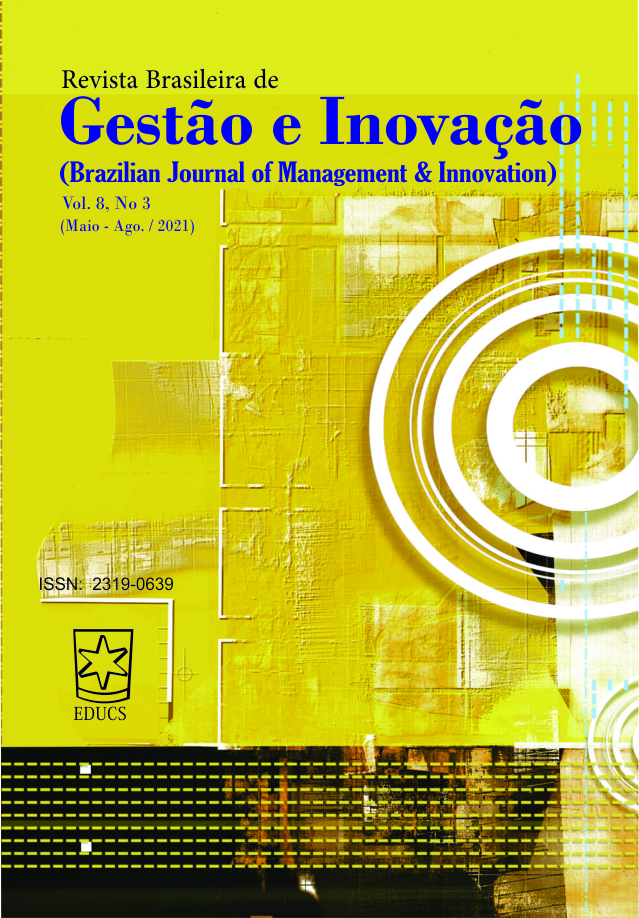RELACIONAMENTO INTERORGANIZACIONAL EM UM AMBIENTE DE COWORKING – UM ESTUDO DE CASO | INTERORGANIZATIONAL RELATIONSHIP IN A COWORKING SPACE – A CASE STUDY
Keywords:
coworking, relacionamento interorganizacional, colaboração, estratégia,Abstract
Com o aumento da incerteza e da competitividade, a colaboração entre empresas se mostra como uma atividade cada vez mais comum nos mais diversos ramos. Compreendendo ambientes de coworking, como um local onde a colaboração é intrínseca, o presente estudo analisa o padrão colaborativo interorganizacional existente em um espaço de coworking em uma cidade localizada na região central do Paraná, baseado na lógica das colaborações identificada por Capdevila (2014). Os padrões colaborativos diferem de acordo com o perfil da gerência, assim como do perfil dos colaboradores e de seus interesses, podendo ser divididos em três abordagens: a primeira, é baseada na redução de custos, a segunda, é baseada na obtenção de recursos e a terceira, é chamada de colaboração relacional, focada no desenvolvimento da rede interorganizacional como um todo e não em benefícios individuais. A realização da pesquisa se deu por meio de uma abordagem qualitativa com a utilização de entrevistas semiestruturadas e análise de conteúdo. As evidências do presente estudo demonstraram que o padrão colaborativo do ambiente pesquisado, se caracteriza pela redução de custos. As contribuições do artigo são relacionadas ao melhor entendimento sobre as práticas colaborativas em espaços de coworking por meio da verificação de que os membros desses locais influenciam e são influenciados por todos que compartilham o ambiente.
========================================
DOI: 10.18226/23190639.v8n3.05
Patricia Souza dos Santos Latchuk*, Universidade Estadual do Centro-Oeste (UNICENTRO). Brasil.
E-mail: paty.s.arte@gmail.com
Marcos de Castro, Universidade Estadual do Centro-Oeste (UNICENTRO). Brasil.
E-mail: marcosdecastroms@yahoo.com.br
Marcos Roberto Kuhl, Universidade Estadual do Centro-Oeste (UNICENTRO). Brasil.
E-mail: mkuhl@unicentro.br
Submetido: Março 2020
Aceito: Julho 2020
*Contato para Correspondência
Downloads
Published
How to Cite
Issue
Section
License
The author must guarantee that:
- there is full consensus among all the coauthors in approving the final version of the document and its submission for publication.
- the work is original, and when the work and/or words from other people were used, they were properly acknowledged.
Plagiarism in all of its forms constitutes an unethical publication behavior and is unacceptable. Revista Brasileira de Gestão e Inovação has the right to use software or any other method of plagiarism detection.
All manuscripts submitted to RBGI - Revista Brasileira de Gestão e Inovação go through plagiarism and self-plagiarism identification. Plagiarism identified during the evaluation process will result in the filing of the submission. In case plagiarism is identified in a manuscript published in the journal, the Editor-in-Chief will conduct a preliminary investigation and, if necessary, will make a retraction.
This journal, following the recommendations of the Open Source movement, provides full open access to its content. By doing this, the authors keep all of their rights allowing Revista Brasileira de Gestão e Inovação to publish and make its articles available to the whole community.
RBGI - Revista Brasileira de Gestão e Inovação content is licensed under a Creative Commons Attribution 4.0 International License.
Any user has the right to:
- Share - copy, download, print or redistribute the material in any medium or format, linking to RBGI site.
- Adapt - remix, transform and build upon the material for any purpose, even commercially.
According to the following terms:
- Attribution - You must give appropriate credit, provide a link to the license, and indicate if changes were made. You may do so in any reasonable manner, but not in any way that suggests the licensor endorses you or your use.
- No additional restrictions - You may not apply legal terms or technological measures that legally restrict others from doing anything that the license permits.
#RBGI







